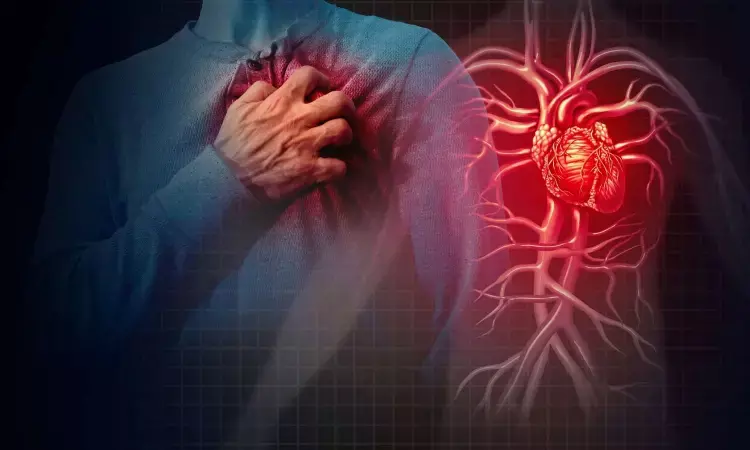- Home
- Medical news & Guidelines
- Anesthesiology
- Cardiology and CTVS
- Critical Care
- Dentistry
- Dermatology
- Diabetes and Endocrinology
- ENT
- Gastroenterology
- Medicine
- Nephrology
- Neurology
- Obstretics-Gynaecology
- Oncology
- Ophthalmology
- Orthopaedics
- Pediatrics-Neonatology
- Psychiatry
- Pulmonology
- Radiology
- Surgery
- Urology
- Laboratory Medicine
- Diet
- Nursing
- Paramedical
- Physiotherapy
- Health news
- Fact Check
- Bone Health Fact Check
- Brain Health Fact Check
- Cancer Related Fact Check
- Child Care Fact Check
- Dental and oral health fact check
- Diabetes and metabolic health fact check
- Diet and Nutrition Fact Check
- Eye and ENT Care Fact Check
- Fitness fact check
- Gut health fact check
- Heart health fact check
- Kidney health fact check
- Medical education fact check
- Men's health fact check
- Respiratory fact check
- Skin and hair care fact check
- Vaccine and Immunization fact check
- Women's health fact check
- AYUSH
- State News
- Andaman and Nicobar Islands
- Andhra Pradesh
- Arunachal Pradesh
- Assam
- Bihar
- Chandigarh
- Chattisgarh
- Dadra and Nagar Haveli
- Daman and Diu
- Delhi
- Goa
- Gujarat
- Haryana
- Himachal Pradesh
- Jammu & Kashmir
- Jharkhand
- Karnataka
- Kerala
- Ladakh
- Lakshadweep
- Madhya Pradesh
- Maharashtra
- Manipur
- Meghalaya
- Mizoram
- Nagaland
- Odisha
- Puducherry
- Punjab
- Rajasthan
- Sikkim
- Tamil Nadu
- Telangana
- Tripura
- Uttar Pradesh
- Uttrakhand
- West Bengal
- Medical Education
- Industry
Novel troponin test detects heart attack quickly and more specifically

Blood sample tests for cardiac troponins are an important cornerstone in the diagnostics of heart attack, but the result may be elevated also due to other transient or chronic conditions, such as renal insufficiency, atrial fibrillation or strenuous physical exercise.
Researchers at Turku, Finland have developed a new test that helps in separating heart attack patients from those whose cardiac troponin values are elevated due to renal insufficiency.The new test may help in identifying myocardial infarction (MI) faster and more specifically and thus improve the treatment of MI patients.
The results of the research have been published in Circulation.
Cardiac troponins are proteins which are normally found in the body only in cells of the heart muscle. According to earlier studies, troponins are released to the circulation in MI as large molecules, while in other conditions troponins are found in the blood as small fragments. A significant problem in current diagnostics is that the commercial troponin tests currently being used at hospitals recognize the combined amount of both large and small troponin molecules.
In a collaboration study between the Heart Center of Turku University Hospital and the Biotechnology unit of the Department of Life Technologies of the University of Turku, a new simple immunoassay test was developed that detects solely the large troponin molecules. A troponin ratio was calculated by dividing the level of large troponin molecules, determined by the new test, by the level of all troponin molecules, determined by the test currently at use in hospitals. This troponin ratio was remarkably higher in MI patients than in renal insufficiency patients, although the results of the current commercial troponin test were similar in these groups.
"More than half of the small troponin elevations detected in emergency department patients are due to causes other than heart attack. The developed test seems to separate very well the small troponin elevations caused by threatening MI from more benign transient troponin elevations," says Professor Emeritus Juhani Airaksinen from the Heart Center of Turku University Hospital.
"A special feature of the test we have developed is that it would be possible to implement it in automated analysis systems in the hospital laboratories, similarly as the commercial troponin tests currently at use in the hospital laboratories," says Assistant Professor Saara Wittfooth from the Department of Life Technologies, University of Turku.
Reference:
K.E. Juhani Airaksinen, Rami Aalto, Tapio Hellman, Tuija Vasankari, Akseli Lahtinen andSaara Wittfooth Wittfooth Originally published31 Oct 2022
https://doi.org/10.1161/CIRCULATIONAHA.122.060845
Circulation. 2022;146:1408–1410
Dr Kamal Kant Kohli-MBBS, DTCD- a chest specialist with more than 30 years of practice and a flair for writing clinical articles, Dr Kamal Kant Kohli joined Medical Dialogues as a Chief Editor of Medical News. Besides writing articles, as an editor, he proofreads and verifies all the medical content published on Medical Dialogues including those coming from journals, studies,medical conferences,guidelines etc. Email: drkohli@medicaldialogues.in. Contact no. 011-43720751


